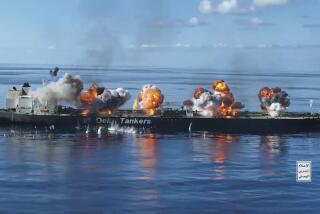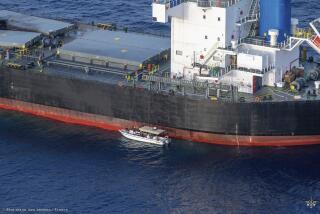France Warns Its Ships to Avoid Gulf : Enter Waters at ‘Own Risk and Peril,’ Official Cautions
- Share via
PARIS — The government said Monday that it has warned all French shipping to avoid sailing in the Persian Gulf, the latest development in the French-Iranian diplomatic crisis.
The French minister for the sea, Ambroise Guellec, informed French shipping companies in a letter dated Friday, the day that France broke off diplomatic relations with Iran, that vessels entering the gulf would do so “entirely at their own risk and peril.”
The statement, released Monday, comes at the same time that the American government is on the verge of placing 11 Kuwaiti ships under U.S. registration and the U.S. flag, entitling them to be escorted by U.S. warships on their journeys between Kuwait’s oil terminals at the northern end of the gulf and the narrow Strait of Hormuz, at the entrance to the gulf.
On July 13, a French container ship, the Ville d’Anvers, was attacked by two Iranian speedboats in the gulf and sustained minor damage from rocket-propelled grenades.
No Quick, Simple End
Authorities in Paris see no quick or simple end to the diplomatic crisis that reached a peak Friday when France severed diplomatic relations with Iran.
The squabble began June 30 when French police magistrates demanded an opportunity to question a member of the Iranian Embassy staff, named Wahid Gordji, about his possible connections with Shia Muslim militants who launched a series of bomb attacks in Paris last year. Eleven people were killed in those bombings, and the resulting decline in tourism caused France considerable economic damage.
The Iranian Embassy here, however, maintains that Gordji has diplomatic status and is therefore exempt from questioning or being charged with any sort of criminal offense.
The French position is that Gordji is listed as an embassy translator or interpreter and does not have diplomatic status. They add that the position is really a cover for the intelligence work he does within the Iranian Embassy staff.
Takes Shelter in Embassy
When Gordji received word that he was being sought by French police, he took shelter in the Iranian Embassy. The French police surrounded the mission, in a fashionable quarter of Paris, questioning anyone going in or out.
In retaliation, the Iranians have placed their revolutionary policemen around the French Embassy in Tehran and have accused a consular officer, Paul Torri, of engaging in espionage and drug smuggling. The French dismiss those allegations as an attempt to get back at France for its insistence on questioning Gordji.
Before leaving for New York and a meeting of the U.N. Security Council on ending the almost seven-year-old Iran-Iraq War, French External Relations Minis-ter Jean-Bernard Raimond reasserted that Gordji will not be allowed to leave France before he has been questioned.
That statement leaves French authorities with a dilemma: When they broke off relations on Friday, they said that they would like to see all Iranian diplomatic personnel departing France by Wednesday or Thursday.
However, that date appears no longer to be hard and fast, since the French have had second thoughts about the safety of their own diplomats in Tehran. It is not clear yet whether the French will attempt to expel the Iranian diplomats, as would normally be the case in a diplomatic rupture, or try to keep them, including Gordji, until they are sure that their own embassy staff in Tehran--11 diplomats and four other employees--would be free to leave the country.
The Ministry for External Affairs said talks were being held for the return home of diplomats from both sides, but a ministry spokesman said the repatriation of embassy personnel “does not concern Mr. Gordji.”
The French position was supported by the Reagan Administration on Monday when White House spokesman Marlin Fitzwater said the French action in breaking links with Iran was justifiable and that “we are supportive of France in this action.”
Referring to the threats made by the Iranians that they might arrest or try French diplomats in Tehran, State Department official Robert Oakley said the United States “fully supports the fundamental principle of diplomatic immunity. Threats against accredited diplomats are a transparent attack on this principle.”
As for Gordji’s sheltering within the Iranian Embassy, the State Department said that is a “perversion of diplomatic practice.”
Pakistan has offered to represent Iranian affairs in Paris just as Italy has done for France in Tehran.
Three Western European ambassadors met with Iranian officials in the Iranian capital Monday and were told that Iran would follow a blow-for-blow policy against any country.
Iran’s Tehran radio said the statement was made by Deputy Foreign Minister Ali Mohammed Besharati at a meeting in the Iranian capital with the ambassadors of Denmark, Belgium and West Germany representing the European Communities.
Tehran radio said the Danish ambassador to Iran asked Besharati to lift the blockade of the French Embassy in Tehran and allow a meeting with the besieged diplomats.
‘We Will Not Submit’
It quoted Besharati as saying, “We will not submit to pressure and blackmail under any circumstances, and we will implement the policy of a blow against a blow toward any country that wishes to violate our rights.”
In Bonn, West German Foreign Ministry spokesman Hans Schumacher said that West Germany is delivering food and other supplies to the French diplomats in Tehran. “So far, there hasn’t been any interference” by Iranian police, he said.
In Brussels, foreign ministers of the European Communities pledged to give France “humanitarian and material” aid. Uffe Ellemann-Jensen, the Danish foreign minister who was chairman of the meeting, said France asked its fellow Common Market partners for support for its diplomats in Tehran and for diplomatic pressure on Iran to abide by the Vienna convention on diplomatic practices. “That’s what they asked for, that’s what they got,” Ellemann-Jensen told a news conference.
In its advisory to French shipping, the French authorities indicated that they are worried that French shipping in the gulf could be subject to specific attack by Iranian warplanes, missiles or gunboats.
“There is an awful lot of activity in the Strait of Hormuz,” said one French authority. “One Iranian naval skipper is threatening on the radio to fire if ships do not stop and identify themselves.”
Although French Premier Jacques Chirac inaugurated a moderate attitude toward Iran when he took office last year, the revolutionary government in Tehran is furious because France is still the second-greatest supplier of arms--next to the Soviet Union--for Iraq, Iran’s bitter enemy in the gulf war.
More to Read
Sign up for Essential California
The most important California stories and recommendations in your inbox every morning.
You may occasionally receive promotional content from the Los Angeles Times.













